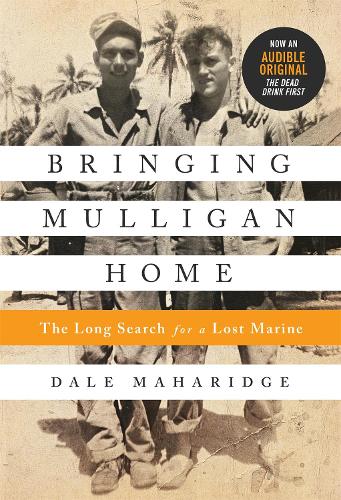
Bringing Mulligan Home (Reissue): The Long Search for a Lost Marine
(Paperback)
Publishing Details
Bringing Mulligan Home (Reissue): The Long Search for a Lost Marine
By (Author) Dale Maharidge
PublicAffairs,U.S.
PublicAffairs,U.S.
27th August 2019
United States
Classifications
General
Non Fiction
940.54252294
Physical Properties
Paperback
384
Width 142mm, Height 208mm, Spine 30mm
320g
Description
Sgt. Steve Maharidge, like many of his generation, hardly ever talked about the war. The only sign of it was a single black and white photograph that he pinned to the wall of his basement, where, in his spare time, he would grind steel. The picture showed Maharidge with one of his comrades---he never said who. In front of his son, Maharidge once yelled over the sound of his steel grinders at the photograph: "They said I killed him, and it wasn't my fault!" After Steve Maharidge's death, his son Dale, an adult now, began a quest to understand his father's outburst: What had happened during the battle for Okinawa, and why his father had remained haunted and all but silent about his experience and the unnamed man. In his quest for the soldier, Maharidge sought out the survivors of Love Company, men in their late 70s and 80s, many of whom had never before spoken so openly and emotionally about what they saw and experienced on Okinawa.
The Battle of Okinawa of World War II began in April 1945---in the following four months, an estimated 250,000 Japanese soldiers and native Okinawans would perish, as would 12,000 American soldiers. Americans called the battle Operation Iceberg, while the Japanese called it tetsu no ame, or the rain of steel. In Bringing Mulligan Home, Maharidge delivers an affecting narrative of war and its aftermath, of fathers and sons, of the generation that survives the shell-shocked men who fought on Okinawa. In a small way, Bringing Mulligan Home fills the silence that has haunted the post-war generation. An established scholar of the American working class, Maharidge also masterfully paints a picture of the industrial working-class landscape that drove men to enlist, and the United States that awaited them upon return.Reviews
A moving memoir. . .A powerful narrative of the dark side of American combat in the Pacific theater and the persistence of resulting injuries decades after the war ended.--Kirkus
Gripping and unforgettable-a son's search for his father in the shattered ruins of the Pacific War--Pulitzer Prize-winning author Richard Rhodes
Through deep and sensitive interviewing, Dale Maharidge has achieved what many have previously thought impossible: he has opened up the silent generation of World War Two veterans and enabled them to tell their stories. These veterans, US marines and Japanese who met as enemies in the Pacific, are no mythologized heroes or villains, but flesh-and-blood humans describing the true horror that has always been, and always will be, war. Maharidge enables these survivors to speak of the war with such honesty that they strip away all its glamour, break your heart and win it all at once. Part memoir, part vivid history, part a searing examination of war trauma, Bringing Mulligan Home gives us an entirely fresh look at The Good War that may well change our view of it forever.--Helen Benedict, author of The Lonely Soldier: The Private War of Women Serving in Iraq and Sand Queen
Author Bio
Dale Maharidge has been teaching at the Graduate School of Journalism at Columbia University since 2001. Before that he was a visiting professor at Stanford University for ten years and spent fifteen years as a newspaperman. Several of his books are illustrated with the work of photographer Michael S. Williamson. The first book, Journey to Nowhere: The Saga of the New Underclass (1985), later inspired Bruce Springsteen to write two songs; it was reissued in 1996 with an introduction by Springsteen. His second book, And Their Children After Them, won the Pulitzer Prize for nonfiction in 1990.
